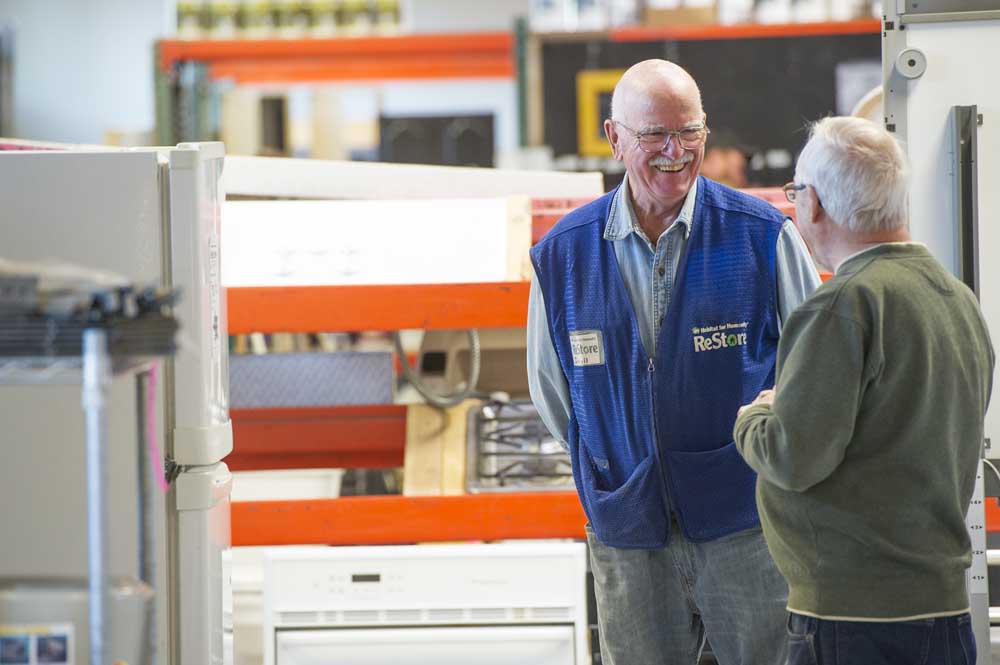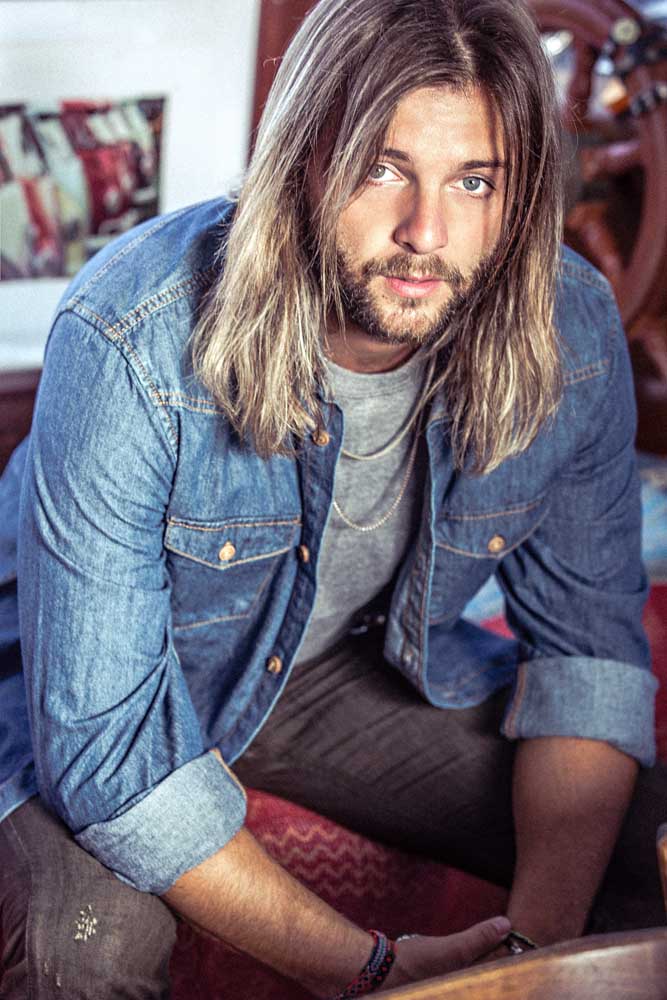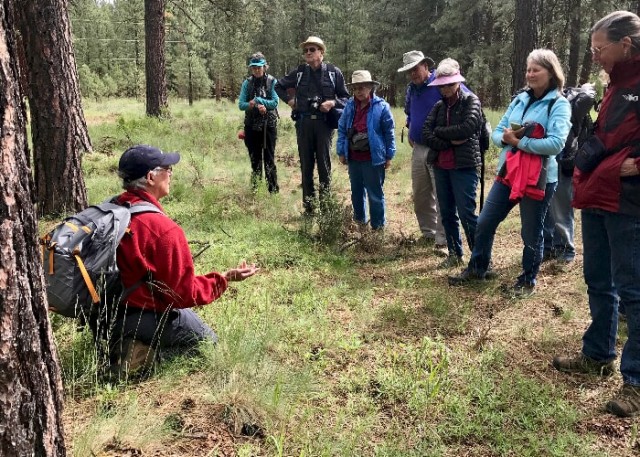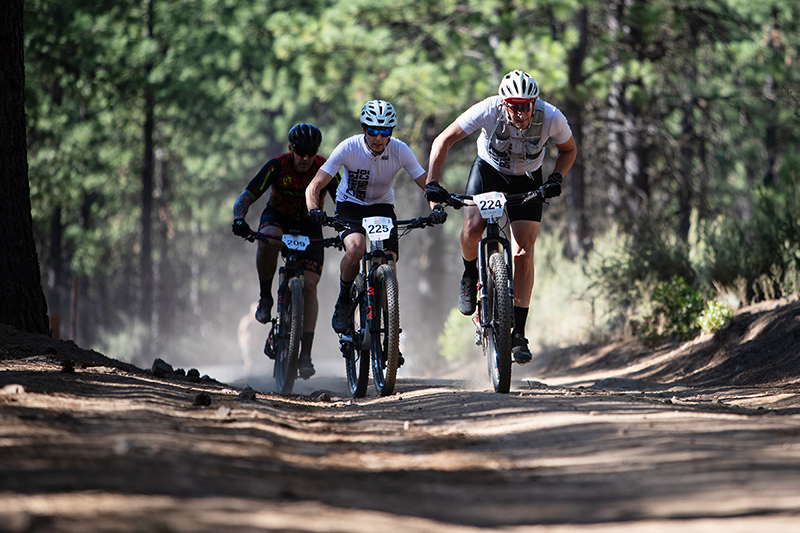A life of giving back
Published 12:00 am Saturday, November 17, 2018

- Daryll Klein helps a customer while volunteering his time at the Bend ReStore on Nov. 8.(Ryan Brennecke/Bulletin photo)
Bend couple Daryll and Mary Klein are the definition of active in retirement.
Daryll, 80, is a former attorney and car buff who volunteers two days a week on the sales floor at Habitat for Humanity’s ReStore in Bend. Before moving to Bend, the couple lived in Sunriver for 17 years, where Daryll volunteered at Second Tern Thrift Shop, a store that raises funds for Sunriver Nature Center and Oregon Observatory.
Trending
Mary, a former medical technician, is a certified master gardener and political volunteer who once traveled with Jesse Jackson’s presidential campaign. Mary also volunteered in ticket sales in the Sunriver Music Festival office. When she was ready to step down from the role, she was so indispensable the festival hired her on as manager of ticket sales from 2002 to 2007.
An avid quilter, she makes and donates quilts to charity, as well as restores and completes antique quilts for friends.
The couple’s interests in giving back overlap as well. In the ’90s, they joined the Peace Corps together. While living in Sunriver, they began hosting members of the Sunriver Music Festival, the annual classical music series.
“Mary and Daryll, they’re so easy to be around,” said Temple City, California-based cellist Nadine Hall, who stays with the Kleins for two weeks during the summer festival. “I just want to be like them when I grow up — and I’m in my 60s. I just adore them.”
Volunteering just comes naturally to them, Daryll said.
“(I grew) up with no father in the house, and a mother that’s gone all the time,” Daryll said. “The Scouts gave a lot to me, and so I (am) just giving back.”
Trending
Over the years, their interests and commitments changed with the growth of their family. Three years ago they moved to Bend to be closer to their daughter and three grandsons. Four mornings a week, Daryll herds the boys off to school and does some cleaning. The couple’s 48-year-old son lives in Thailand, where the birth of their granddaughter brings the grandchild tally to four.
In explaining their decision to join the Peace Corps in 1995, Daryll quoted the famous line from John F. Kennedy’s 1961 inauguration speech, “Ask not what your country can do for you — ask what you can do for your country.”
“(It was) a product of the ’60s kind of thing,” Mary said.
Getting a start
By 1961, Daryll and Mary had already met — on a blind date.
“Well, it was blind for me,” Mary said.
At the time, Mary was a Portland Rose Festival princess. Daryll had a friend who served as a driver for the Festival’s princesses.
“He said, ‘You want to go out with a Rose Festival Princess?’ I said, ‘Sure,’ so he set me up with her,” Daryll recalled. Mary worked at a Custard King in Parkrose, the northeast Portland-area neighborhood where she lived with her family — “All the ice cream I could eat,” she said.
“It wasn’t blind because I went out and checked her out first,” he said.
“Oh jeez. That was the story of his life. You just got an (insight) into his character,” said Mary, admitting she’d seen him on that visit. “I recognized him. He drove off in a little blue Triumph convertible. You don’t miss that.”
Daryll’s mother worked double shifts as a waitress. He, too, learned to work hard.
“If you wanted something, you had to go work for it,” he said. “I worked for a bicycle or a basketball or whatever. And I liked cars. That was the age of cars.”
Mary was born in North Dakota and moved to Portland with her family during World War II.
On their first date, they went to Rooster Rock State Park on the Columbia River, where “we just sat and talked,” she said. Four years older than Mary, Daryll was heading into his senior year at the University of Oregon, where he studied finance.
“My mother always said, ‘Don’t be a bum,’ so I decided I’d go to law school,” he said, laughing. “My dean just laughed at me. He looked at my transcript, and I was a flat-C student because I never did my homework, never studied. I don’t know if you know the movie ‘Animal House,’ (but) it was filmed at our fraternity.”
Nevertheless, Daryll got his act together in his senior year.
“I studied, got good grades and they let me in,” he said.
What changed? “He started going out with me,” Mary said.
After graduating in 1960, he studied law at U of O — where Mary transferred after two years at Oregon State University.
“I told my parents I transferred because there was coursework at U of O that was not offered at Oregon State, but Daryll was part of that,” she said.
“She graduated in three years because her father said she couldn’t get married until she graduated,” Daryll said.
After graduation, she interned in Eugene for certification in medical technology, a field she worked in for many years.
Daryll, meanwhile, had worked all through college and law school as a gardener for a couple. In the summertime, he also drove a laundry truck.
“I paid for my college,” he said. His stint in ROTC also garnered him a small stipend, “which paid for your wedding ring,” he said to Mary, whom he married in 1962.
After Daryll finished law school in 1963, the Kleins headed to McGuire Air Force Base in New Jersey. While putting his law degree to use in the Air Force, he also played some tennis, a sport he’d picked up in college.
“My daughter thinks that’s all I did in the military. We played doubles a lot,” Daryll said. “My partner was the base commander; he was a general. He would call my boss and say, ‘Can Daryll come out and play tennis?’ My boss would say, ‘The general’s on the phone, get out there!’”
However, he also put to use his legal knowledge, trying about 60 court-martial cases, and also helped review court trials and write opinions.
After his discharge, the couple bought a sports car and traveled around Europe, then headed home to Portland. Daryll joined a law firm. During his time there — 1966 to ’82 — it grew from five lawyers to 45, and Daryll became a senior partner.
Throughout the years, and despite careers and raising their kids, the two had a penchant for giving back. Mary volunteered for many years for an education foundation, and Daryll was active in the Rotary Club and Jaycees.
In 1965, he and a friend started a new Boy Scouts troop, which they led until 1968.
“We wanted to do a project, and I had been a Scout myself, so I said, ‘Let’s form a troop in north Portland.’ That’s where I (had gone) to school. … We formed an all-black troop of maybe 25 to 30.”
In the mid-1980s, Daryll took a three-year sabbatical from his law firm to volunteer with Beyond War, an anti-war movement for which he helped develop a national strategy for education. The two moved the whole family to Palo Alto, California, during that period and also led meetings and seminars in Washington state.
Welcoming change
When they returned to Portland, Daryll went into private practice, specializing in Workers Compensation defense. Then a shift in the Workers Comp law changed the nature of his practice.
“My practice basically went away,” he said. “I’m wondering, ‘What am I going to do?’”
Watching TV late one night, Daryll saw a salesman’s pitch that inspired his next move. “He was selling something like ant farms. He said, ‘Well, if you don’t buy my ant farm, you should do what you like.’ It was like a light bulb came on. I said, ‘I like cars.’”
So, in 1990, he and Mary bought and ran U-Save Auto Rental.
“I said I’d do it for five years,” Mary said. She didn’t have to go quite that long. Four years into owning U-Save, during which it grew from 45 to 75 cars, an offer was made on the business’s property — a large parcel on busy McLoughlin Avenue in Portland. After estimating what the business and property would be worth in five years, they tacked on an additional $25,000 to his asking price, and the buyer agreed. Daryll also sold the company’s phone number and cars to a dealership that rented cars.
“I basically sold our business twice. At that point, we didn’t have to work,” he said.
“We sold it in 1994, and then we took almost a year to figure out what we were going to do with our lives,” Mary said.
Peace Corps
The two began looking into volunteer programs that would take them abroad, going so far as to visit the headquarters of the International Executive Service Corp in New York, Habitat for Humanity in Georgia and the Peace Corps in Washington, D.C.
They opted for the Peace Corps. Daryll requested they be placed “where it was warm and I could fish,” he said, laughing.
Instead they were offered Romania.
“I said, ‘Where’s Romania?’” he said, laughing. They ended up spending a couple of years in Constanta, Romania, working in business development. At the time, the region was emerging from behind the Iron Curtain.
“Our task was to work in a business center — kind of like the Chamber of Commerce here — and assist small businesses starting to develop,” Mary said. “We spoke present tense, baby Romanian. We could be understood, and I could pretty much understand what other people were saying — but fluent? No.”
Their first month there, “we were just paraded around as their American representatives,” Daryll said. “We would say, ‘Where are we going? What are we doing here?’ And when we got back, we’d say the same thing.”
Then they showed their hosts a potential business plan.
“(We) said, ‘These are the types of things we could do over the next two years. What would you like us to do?’ They said, ‘Everything,’” Daryll said.
They set to work, getting the business center its first computers, Mary teaching courses in business English. Daryll teaching economics.
The idea of classroom discussion and participation was fairly new to his students, who traditionally spat back their teachers’ words, Daryll said. So he added incentive to his lessons.
Using Monopoly money, he told them, “You have to participate, and you earn this money,” he said. “‘We’re going to do a banking system, and at the end of the course … you can buy all these things that are on the table.’ I said, ‘Now, where am I from?’ and the hands all went up.”
They were encouraged to pursue extracurricular volunteer work, so Daryll partnered with the other two lawyers in their Peace Corps group and held moot trials to show how the legal process worked.
“They did not have a court system, and there was no contract law in Romania,” Mary said. She, meanwhile, worked in her spare time with Aid to Artisans, an organization that helps artists and crafters navigate the export market.
“Romanians didn’t want (to buy their own) native crafts, so the objective was to help them,” she said.
By the time their Romanian adventure was done, Daryll had only been fishing once. He did not catch anything.
Back in the States, they traveled around Washington and Oregon for a few months, looking for their next home.
After seeing about 75 houses, they stopped by Sunriver. It was not on the original itinerary, but they’d vacationed there during their Portland years. They checked out three homes and soon bought one.
During their years in Sunriver, where Mary took up hand quilting, the Kleins became involved in a litany of volunteer efforts. Daryll joined the Citizen Patrol and cleaned bike paths.
Hall, the California cellist who stays with the Kleins each August, has been with the Sunriver Music Festival for more than 30 years. No one is sure how many years she’s stayed with the Kleins, but the number is probably over 10.
“I feel so incredibly fortunate, and (it’s) just a gift to know these people,” Hall said. “It’s a lot of work to have someone at your house for two weeks. … These relationships, when you find the right fit of a host, are just golden.”
The Kleins even opened up their home to her husband and daughter, but their generosity didn’t stop there. When Hall asked Mary to take a look at her great-grandmother’s hand-stitched quilt blocks, which had been sitting in a box since the 1940s, she did so thinking Mary might recommend someone in Central Oregon who could make them into a quilt.
“(Mary) said, ‘Absolutely not. I’m doing this,’” Hall said. “Aside from the work of putting it together, she had to go consult with people in Sisters on how to deal with this fragile material, all this stuff. She took this on and had this done in a matter of weeks. It was amazing. And now I have these beautiful keepsakes with her name on them.”
— Reporter: 541-383-0349, djasper@bendbulletin.com








